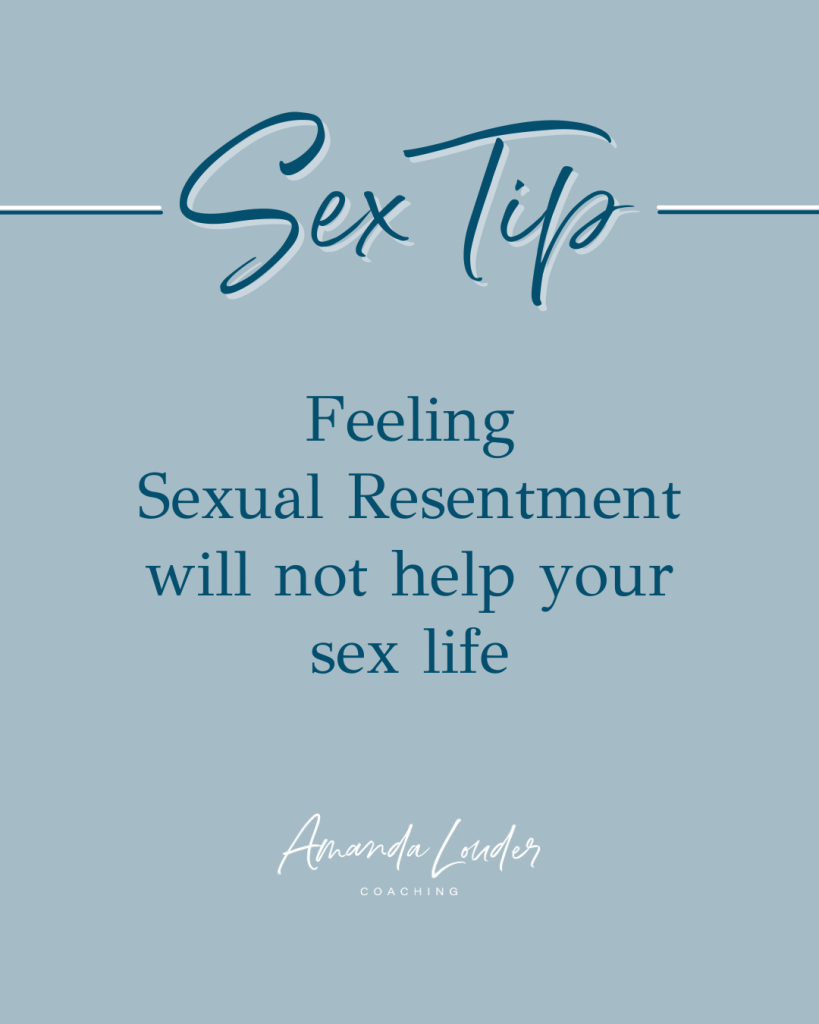
Sexual Resentment is a complex emotion where we feel our needs are not being met in one way or another. If we take a step back and look at the stories that we are telling ourselves about our spouse and their inability to meet our needs, we can see that those stories are simply not true. They are not serving us well and in fact are eroding our connection and trust in our marriage. So, how do you change that narrative you’ve been telling yourself about why your spouse isn’t meeting your needs? Let’s talk about it.
Show Notes:
Follow Amanda on Facebook and Instagram.
Join Amanda’s Private Facebook Group.
References for this episode:
Show Summary:
Today, we’re delving into the intricate layers of sexual resentment and how reshaping our narratives can lead to profound healing and connection within our relationships.
Let’s begin by exploring the essence of resentment itself. Resentment is a complex emotion, often rooted in unmet needs, unfulfilled expectations, or perceived injustices. When resentment intersects with our sexual relationships, it can cast a shadow over intimacy, eroding the very foundation of connection and trust.
When thinking about resentment, we often associate it with the anger family when it comes to emotions. We often feel resentment when we perceive others to not be working or sacrificing or grinding or perfecting as hard as we are. But in Brené Brown’s book Atlas of the Heart she puts resentment in the envy family, which I found quite interesting.
She says
- “I’m not mad because you’re resting. I’m mad because I’m so bone tired and want to rest. But unlike you, I’m going to pretend that I don’t need to.
- I’m not furious that you’re ok with something that’s really good and imperfect. I’m furious because I want to be okay with something that’s really good and imperfect.
- Your lack of work is not making me resentful, my lack of rest is making me resentful.”
When we talk about sexual resentment, we’re addressing a specific manifestation of this emotion—one that arises from discordance in desire and intimacy within a relationship. Whether you find yourself in the role of the higher desire or lower desire spouse, the experience of sexual resentment can be deeply distressing and disruptive.
For the partner with higher desire, it may feel like a relentless ache of longing, met with repeated rejection or indifference. Every declined advance can reinforce feelings of inadequacy, rejection, or even betrayal. The story they tell themselves might revolve around themes of not being desired, valued, or loved as deeply as they desire to be. The resentment comes in with thoughts like “I’m not mad that I desire you. I’m mad that you don’t seem to desire me the same way.” And “I’m upset that I try so hard to be a good spouse, doing everything you want and desire and you won’t do the same for me.” “Wouldn’t it be so nice to have a partner who put in so much effort so that I didn’t have to put in near as much.” And “You say you love me, but if you did, you would try harder to do what I want and need in this relationship.”
Conversely, the lower desire partner may carry the weight of guilt, shame, or inadequacy for not meeting their partner’s needs or expectations. They may feel overwhelmed by the pressure to perform sexually, viewing it as a duty rather than a source of pleasure. Their narrative might be steeped in feelings of being inadequate, burdened, or even resentful for feeling coerced into intimacy. The resentment comes in with thoughts like “I’m mad not because you desire me but because it’s so easy for you and so hard for me.” Or “I’m upset because you don’t see all of the ways I do love you and only the ways you think that I should but don’t.” “I’m upset that I am required to do this to be a good wife but you aren’t required to do what I need in order to make that happen.”
Now your thoughts as the higher desire partner or the lower desire partner may look different than the ones that I have offered here, and that’s ok. What is most important is that you understand where it is coming from for you. What are you not getting that you think you should? Where do things seem unfair? Where does your envy lie?
Now, let’s explore how reshaping these narratives can be a powerful antidote to sexual resentment and pave the way for deeper connection and intimacy.
First and foremost, communication emerges as the cornerstone of transformation. Couples must create a safe space to share their innermost thoughts, desires, and fears without judgment or reprisal. Through open dialogue, partners can begin to unravel the stories they’ve been telling themselves about their marriage and sexual relationship.
Identifying and challenging these narratives is a crucial step towards healing. Couples can explore questions such as: What beliefs or assumptions underpin our feelings of resentment? Are there unspoken expectations or hidden fears driving our behavior? What familiar, religious, and societal conditioning is at play in shaping these narratives? What results am I getting with my current narratives? By shining a light on these underlying narratives, couples can begin to rewrite their story together.
Changing these narratives involves cultivating empathy and understanding for both oneself and one’s partner. Rather than viewing each other as adversaries, couples can strive to see the humanity in their shared struggles. Practicing empathy allows partners to validate each other’s experiences and emotions, fostering a deeper sense of connection and intimacy.
Self-care and personal growth also play pivotal roles in transforming narratives and healing resentment. Each partner must take ownership of their own happiness and fulfillment, independent of their relationship. By investing in activities that nourish their mind, body, and soul, individuals can cultivate a sense of wholeness and self-worth that transcends their sexual relationship.
Finally, seeking professional support can provide couples with the tools and guidance needed to navigate sexual resentment effectively. Qualified professionals can offer insights and strategies tailored to each couple’s unique needs and circumstances.
In essence, transforming narratives around sexual resentment requires courage, vulnerability, and a commitment to growth and connection. By challenging outdated beliefs, fostering empathy, and prioritizing self-care, couples can create a new narrative—one grounded in understanding, compassion, and profound intimacy.
I do have some spots opening up for more couples, so if you are interested in couples coaching you can visit amandalouder.com/couples to schedule your consultation.
Remember, love is a journey, not a destination. Stay committed, stay passionate, and stay connected. Goodbye for now.




